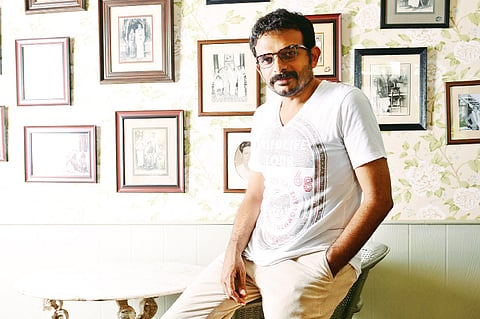

The only time my interview with musician T M Krishna doesn’t seem like a rapid fire round is when I ask him to verbalise his angst with the kutcheri (a concert format in Carnatic music). In a far corner two-seater at the cafe in Chamiers—which the singer calls his den—the Chennai-based musician’s ripostes come with the ease of someone who has battled questions several times before. It is only when this poser comes that his inimitable deep voice—which thrills his rasikas to bits—takes a minute’s break.
“Today, I can completely choreograph the audience response for a concert,” he says in response, lamenting the predictability of the structure of the kutcheri. “I can even say what time of the performance the audience will applaud,” he adds for good measure. And then it dawns that he isn’t averse to the existing template as much as he is to the want of sticking to any template.
“Seriously, music can be screwed up by some and we won’t have a problem. But we surely have an issue if we alter the singing format of a concert,” he says, indignantly. In such a set-up, Krishna warns that youngsters can sing well by simply mugging and rendering 15 compositions without an aesthetic value. “Format doesn’t define music. Let art govern art, not the audience,” he speaks on the old chestnut with a vigour that must be hard to recreate, unless you are one who rallies for issues in the Carnatic music industry. And the 36-year-old Krishna is a maverick through and through. “I speak for what I believe in, and that is shaking things up here,” is his flat-out reasoning.
It is today expected of T M Krishna to deliver the unexpected. On stage, he is known to have whipped up his main piece ten minutes into the concert after a short warm-up number, jolting his audience that is used to ingesting it midway in a traditional kutcheri. Off-stage, he can be seen as a revivalist of sorts, trying to bring back the glory of the temples as centres of cultural activity. This is by the Kalaachaara Marumalarchi Trust that he founded in 2005 with wife Sangeetha Sivakumar (also a musician) and a couple of others to regain the place of worship’s role as something more than just that.
“Historically, temples have served as cultural hubs for spreading knowledge. This tradition still exists in Kerala, where arts are performed in temples that everybody has access to,” he says. But Carnatic music, he says, is hubbed in big cities here, restricting its accessibility to all. “Today, we’ve broken the function of temples for sure,” he says.
But the musician might not be so accommodating when he ascends stage and finds you’re recording his performance or walking out during the tani avarthanam (performance of accompanying instrumentalists). “The reason to ask people to not record is not economic. I think it’s disrespectful to assume that your Rs 100 ticket can entitle to record, without even consulting the performer,” he says, assertively. As for the tani avarthanam, he sums it up saying the rasikas should stop thinking of it as a pee-break.
That aside, T M Krishna is all generosity when it comes to those looking for serious guidance on music. His initiative—Shabda—a website that serves as a repository of information on the arts, modelled on the TED talks, where musicians and scholars are urged to take up one specific core point, and speak about it for 20 minutes.
And keeping in tune with his nonconformist nature, Krishna who usually does 120 concerts a year, took on a music holiday in 2010 when he reduced his performances in the margazhi season. Recalls he, “I felt like I should just listen to music that year as a rasika.” And why, because he says musicians—being the performers that they are—often forget to listen!